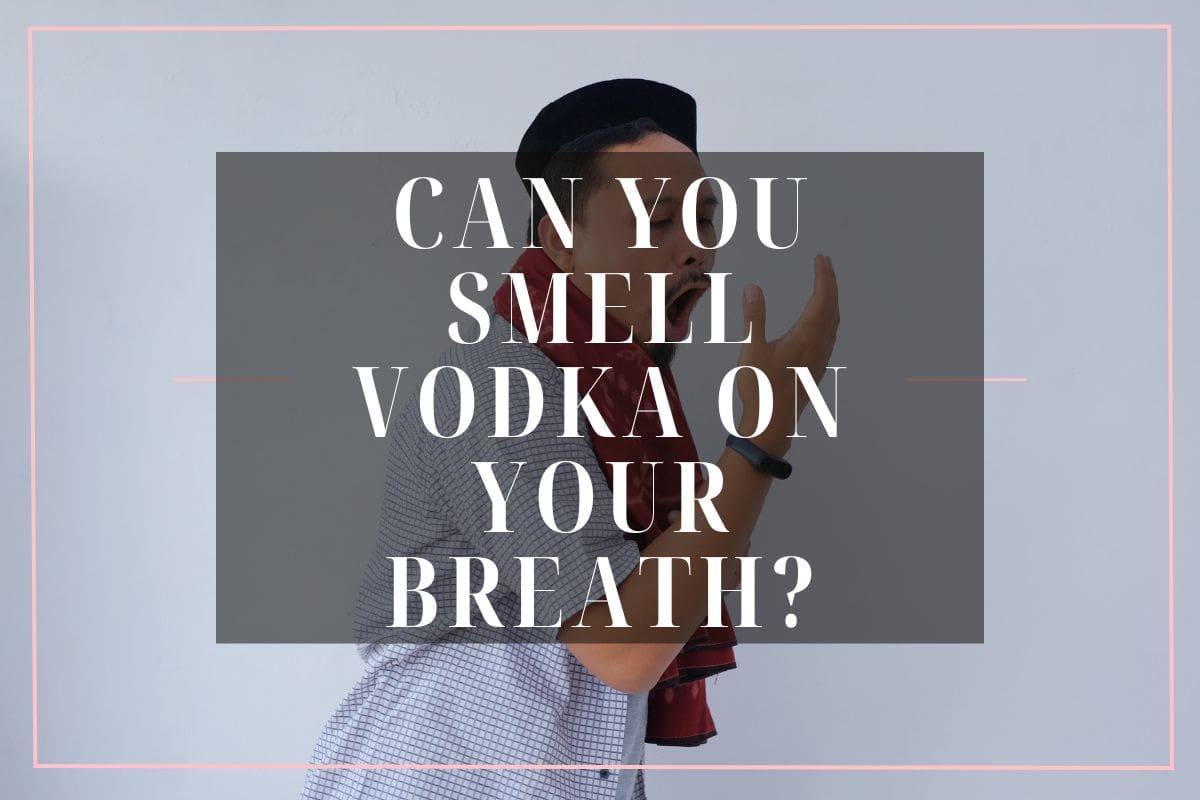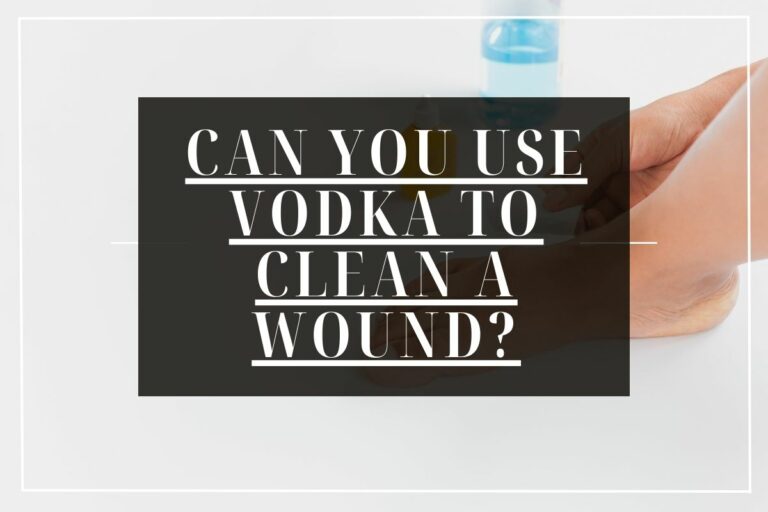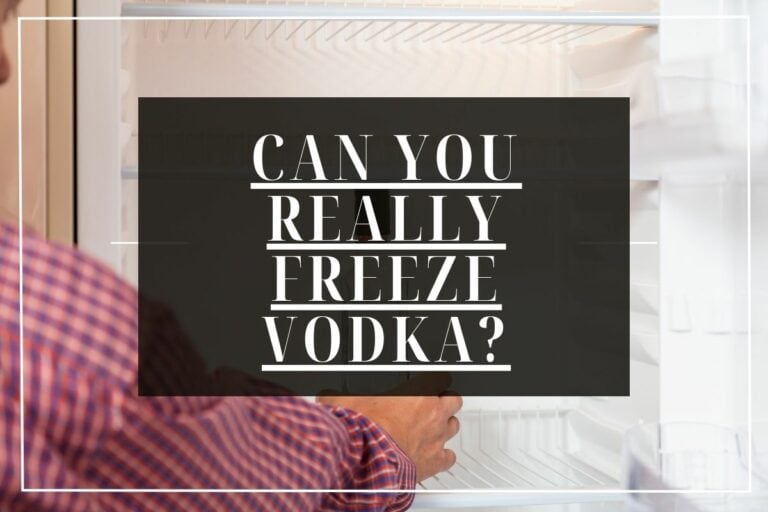Can You Smell Vodka On Your Breath?
Are you wondering if the sharp scent of vodka lingers on your breath after a drink? An interesting fact is that alcohol itself does not have a distinct smell, and it’s often the other components in our beverages that give off an odor.
This blog post will delve into the characteristics of vodka, debunk some myths, and provide clear explanations on whether one can really smell vodka on someone’s breath. Intrigued? Continue reading to unlock this intriguing mystery about your favorite spirit!
The Chemistry of Alcohol
Understanding the chemistry of alcohol starts with its basic makeup. It often has a distinctive smell, but what about vodka? Comparing the properties of vodka to other alcohols might shed some light on this intriguing question.
The basic makeup of alcohol
Alcohol is made of tiny pieces called carbon, oxygen, and hydrogen. These three things join together to form alcohol. This mix can melt into water easily. It also has a light smell that some people might know right away.
Our body turns alcohol into different stuff inside our liver. After changing it once, the body changes it again until it becomes two things: a gas we breathe out called carbon dioxide and water.
Why alcohol has a smell in the first place
Alcohol does have a smell. It’s an organic compound that can mix well with water. This is why you can smell it in your drink. After drinking, the body starts to break down the alcohol.
The liver does most of this work. Some alcohol gets out through our skin and urine too. Much more of it comes out from our breath when we exhale because it goes from our blood into our lungs.
All these give off a smell caused by beer, wine or liquor like vodka.
The properties of vodka compared to other alcohols
In comparison to other alcohols, vodka has unique properties that set it apart.
| Property | Vodka | Other Alcohols |
| Color | Clear or white. | Can vary from colorless to amber, depending on the type of alcohol. |
| Odor | Believed to be odorless, leaving virtually no odor on the breath. | Has a distinctive smell that can be detected on the breath. |
| Flavor | Considered flavorless due to its lack of congeners. | Can have strong flavors due to the presence of congeners. |
| Composition | Primarily composed of ethanol and water. | Composition can vary depending on the type of alcohol. |
| Residual Smell | The smell of vodka on the breath may not last as long as other alcoholic beverages. | The smell of other alcoholic beverages can last longer on the breath. |
| Physiological Effects | Some people may experience a “rubbing alcohol” smell when sweating after consuming vodka. | Does not typically produce a “rubbing alcohol” smell when sweating. |
The Odorless Myth
The belief that vodka is odorless has long been prevalent. This myth seems to have origins in the distinctive qualities of vodka itself, with its clear color and seemingly milder aroma compared to other spirits.
However, recent scientific studies present factual evidence challenging this misconception, showing that vodka indeed gives off a detectable smell when consumed.
The popular belief that vodka is odorless
Many people think vodka has no smell. This idea is known as “The Odorless Myth“. The Bureau of Alcohol, Tobacco, Firearms and Explosives sees vodka as colorless, tasteless, and without a scent.
Its lack of strong flavor makes it seem odorless to many. Some even believe that when you mix vodka with other liquids in a bottle, it loses its smell completely. But this is not true at all! Vodka does have an odor.
It’s light but there if you take the time to sniff it out! So don’t let the myth fool you.
Debunking the myth
For a long time, vodka has been characterized as an odorless, flavorless spirit, a notion backed by formal regulatory definitions. However, this long-standing perception is being reevaluated. The Alcohol and Tobacco Tax and Trade Bureau (TTB) has conducted a review and has concluded that the conventional requirement for vodka to be “without distinctive character, aroma, taste, or color” is outdated and does not meet modern consumer expectations.
The variety of craft vodkas and those infused with botanicals, fruits, and spices challenges the outdated idea that vodka lacks flavor or character. In essence, vodka has evolved, and so have the palate and preferences of those who enjoy it. The notion that all vodka is the same and devoid of distinct characteristics is becoming a myth of the past.
How the Human Nose Works
Diving into the fascinating world of our olfactory system, we’ll uncover how our noses detect and interpret alcohol odors. There’s an intriguing war between vodka’s reputed invisibility and human scent-detection you would love to explore, stay with us!
The anatomy of smell
Our noses help us smell things around us. The nose gets this done by using scent receptors. There are about one trillion of these tiny helpers in our nose! When we sniff, air filled with scents moves into the nasal passages and reaches these receptors.
They hop on mucus proteins for a trip to parts of the nose called olfactory dendrites. Here each smell attaches or binds to a receptor. This starts an electric signal in the nerves of your nose and sends information to your brain about what you smell.
Sensitivity to alcohol odors
Your nose plays a big role in how you sense the smell of alcohol. It picks up on olfactory cues, or scent signals. Drinking alcohol can make your breath have a noticeable smell. This is true for different types of alcoholic drinks too.
Some odors are very strong and may even cause breathing issues for some people.
There’s an interesting fact about the human nose though – its sensitivity to alcohol smells may depend on your genes! People with a certain genetic makeup, called GABRA2 genotype, could be more sensitive to these odors than others.
Also, did you know that smoking dulls your sense of smell more than drinking does? So if someone smokes and drinks, they might not notice the boozy smell as much. But that doesn’t mean it isn’t there!
Remember this when trying to mask or wonder about any alcoholic scents around you. Your nose knows best!
Factors that can influence our sense of smell
The way we smell things can change based on many things.
- Our age can shape our sense of smell. As we grow older, our ability to smell different smells might not be as good.
- If you are a boy or a girl can also make a difference in how you smell things.
- People who smoke may not have the same sense of smell as those who don’t.
- Our health plays a part too. How well we eat, how much rest we get, and how active we are can all change the way we smell.
- Tasting food gives us some smells too because tasting and smelling are close friends.
- Living around certain smells all the time can make us used to them so that they don’t seem as strong anymore.
- Other factors like being around chemical signals too much or living where there is lots of pollution may affect our sense of smell.
Breath Analysis
Breath tests, commonly called breathalyzers, play a crucial role in detecting the presence of alcohol in our system. These devices work by estimating blood alcohol concentration (BAC) from a breath sample.
At times you may wonder why these sophisticated tools manage to detect traces of vodka while humans generally don’t; this rests on their advanced technology designed specifically for capturing even minute particles of ethanol (commonly known as alcohol), which are expelled through human breath upon consuming alcoholic drinks.
Oddly enough, it exposes the fact that although vodka has a very light odor, its scent is not entirely undetectable.
How breathalyzers work
Breathalyzers work in a very special way.
- They take a sample of your breath.
- They focus on the ethanol content in this breath sample.
- This sample triggers a potassium dichromate reaction.
- The reaction makes a color change happen.
- By checking the change in color, the device can tell how much alcohol is there.
- But the thing is, it doesn’t measure blood alcohol content or BAC right away.
- It’s just about catching the alcohol level that exists in your breath.
- If something doesn’t look right, they might want to draw some blood for testing.
- Breathalyzers can also find diseases by looking at your breath.
Why breathalyzers can detect alcohol but humans may not
Breathalyzers use science to find alcohol in a person’s breath. These tools give a guess of how much alcohol is in the blood. This is called blood alcohol content (BAC). They do not measure BAC directly, but it is close enough for most uses.
People can’t tell their own BAC very well on their own. The SCRAM CAM bracelet helps tell if the drink is from skin or inside the body. How much and when you drink affects how long a breathalyzer will pick up alcohol.
Practical Scenarios
When it comes to practical scenarios, we need to consider different situations where the smell of vodka on your breath could play a significant role. In job interviews, can you really sneak under the radar? Let’s discuss whether others can detect alcohol in social settings.
We must also address driving under influence; understanding why risking this is not worth any possible concealing tactics proves critical for safety reasons.
Job Interviews: Can you get away with it?
Drinking vodka before a job interview is a bad idea. The smell can linger on your breath, even if you think it does not. Many workplaces have rules against drinking during work hours.
If an interviewer smells alcohol, they may worry that you don’t follow the rules. This could hurt your chances of getting the job. The same goes for Zoom interviews too because some people might be able to tell if you’ve been drinking.
Also, other things like medication could cause a person to smell like alcohol so it’s best to avoid any doubts and stay clean for your interview day. It’s good to know that personal hygiene and breath freshness are also high on the list in most professional settings.
Social Settings: What others can smell
In social groups, others can often smell vodka on your breath. The strong smell of vodka is hard to hide. Even if you try hard, the odor may give you away. This happens because vodka has things in it that bring out a unique smell.
Drinking too much also pulls more bad-smelling stuff into your mouth which stays onto the next day, adding to the problem. So trying to sip drinks at a party might not work as well as you think!
Driving Under the Influence: Why it’s not worth the risk
Driving drunk is not a smart move. It’s a crime to operate a vehicle after enjoying drinks. Alcohol impairs most people’s ability to drive safely, even if they don’t “feel” drunk. Alcohol may slow the response time or cloud thinking in dangerous ways.
Some cannot walk straight, talk correctly or do normal tasks.
Police use breathalyzer tests to check for this problem on streets and highways. This test shows how much alcohol is in a person’s system by checking their breath. If it’s over 0.08%, that means trouble! By law, it’s too high and you’re out of bounds for safe driving.
Drivers younger than 21 must be careful too! No Tolerance policy says no alcohol at all while driving around town for them! They could get into big trouble fast if caught with any booze trace inside them!
Getting caught could mean loss of your license, hefty fines or even jail time depending on state laws concerning DUI (driving under influence). Even worse? Crashing because of being drunk can injure –or kill– others around you on the roadways or sidewalks as well as yourself!
So think twice before drinking then jumping behind your car wheel afterwards! The risk tied-in can be huge plus very harmful!
Can Food Mask the Smell?
Explore the common belief that certain foods or drinks can mask the smell of alcohol, including where this idea originated and a scientific perspective on its validity. Delve into which foods may effectively hide the smell, if any exist at all.
Finally, provide practical advice for those who might need to conceal alcohol breath for valid reasons (emphasis on responsible drinking).
Common beliefs about food and drink disguising the smell of alcohol
Many people think eating food or drinking can hide the smell of alcohol. They chew gum, eat mint and garlic, or drink coffee after having vodka. Bad breath from vodka is said to go away with these tricks.
Yet, no clear proof shows foods and drinks can mask the strong smell of alcohol. A fun fact: while garlic might cover up bad breath for a little bit, it doesn’t take the odor out completely! So don’t rely on mints or mouthwash to beat a breath test from police!
Scientific take on whether food can actually mask the smell
Science proves food can hide the smell of alcohol on your breath. Foods with strong scents work well in doing this. Spicy foods and those with onions are the best at this task. The alcohol scent impacts our brains and helps drive how much we drink.
Similarly, gulping down a lot of drinks changes how our taste and smell nerves respond. Using mouthwash that contains some level of alcohol can also give short-lived help for boozy breath.
Best practices if you need to conceal the smell (for legitimate reasons)
Sometimes, you need to hide the smell of vodka for good reasons. Here are some tips that might help:
- Eat foods with strong smells like onion or garlic. They will coat your mouth and hide the smell.
- Drink a lot of water. This washes away alcohol and gets rid of bad breath.
- Use mint as a breath freshener. It gives your mouth a good feel and smell.
- Use perfume or scented sprays, but don’t go overboard. You don’t want to give off too strong a scent.
- Chew gum after taking vodka. This masks the alcohol smell and even adds freshness to your breath.
- Do not use alcohol – based mouthwash! It can mix with the vodka smell and make it stronger.
- Try odor neutralizers or aromatherapy oils. They might help reduce the smell around you.
Mouthwash and Gums: Do They Help?
Explore the world of mouthwash and gum, examining their claims of eliminating bad breath. Dive into how effective these tactics truly are against alcohol odor – are they lifesavers or just a myth? Discover the advantages and pitfalls right here to reveal surprising insights.
Ready for some revelations? Let’s dive in!
Types of mouthwash that claim to remove bad breath
Bad breath can be a bother. Mouthwash companies say they can help. Here are some types of mouth wash that say they fix bad breath:
- Antiseptic Mouthwash: It makes your mouth fresh. It also helps with mouth sores. But, use it for only short times.
- Mouthwash with Chlorhexidine Gluconate and Chlorine Dioxide: These kinds fight bad breath well.
The effectiveness of mouthwash and gum
Mouthwash kills mouth bacteria at first. It does so fast, but it won’t fix bad breath for a long time. Alcohol-free mouthwash is gentle on your teeth and gums. It doesn’t harm enamel or make your gums sore like some washes can if they have alcohol in them.
Yet, you may still have bad breath after using one that’s free of alcohol because it misses some nasty bacteria. Also, using mouthwash too much can upset the balance of good and bad germs in your mouth.
Chewing gum might help cover up foul odors too, but this only works for a short span. Some types of gum might also cause tooth damage over time if they contain sugar. So weigh the pros and cons before deciding to use these as solutions for smelly breath from drinking vodka or any other odor issues.
The pros and cons
Mouthwash and gum can help your breath smell better. They kill bad germs in your mouth. This makes your gums and teeth strong. But, they can’t stop holes from forming in your teeth.
Some people say mouthwash gives you cancer, but that’s not true yet. Still, too much of it is bad for you – it has side effects. Always use the right amount! Gum does a good job too.
It keeps our oral health on point which means fewer bacteria come into play!
Conclusion
Vodka on your breath can sway others to think you drank. Even one shot of it can leave a smell. This scent may not be loud but keen noses will note its shadow. Try food, mouthwash or gum to hide the vodka smell but remember, they don’t work for everyone!





